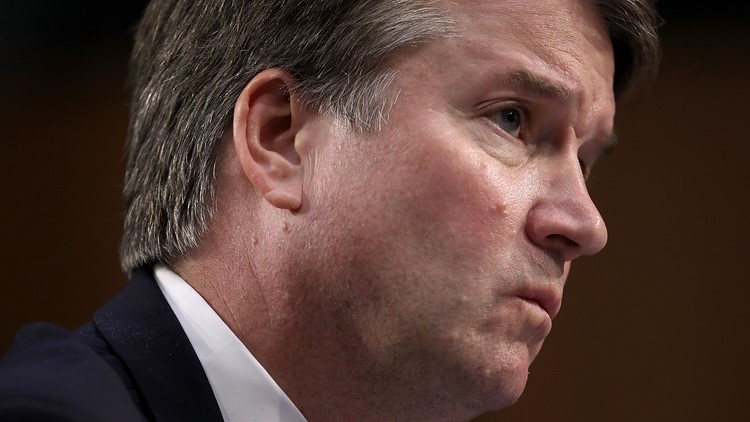WASHINGTON — The Senate confirmed Brett Kavanaugh’s nomination to the Supreme Court on Saturday.
With 50 senators voting “yes” and 48 senators voting “no,” Kavanaugh was confirmed with a nearly party-line vote and one of the narrowest margins ever. His confirmation will tilt the Supreme Court further toward conservatives potentially for decades to come.
For weeks, Kavanaugh's future has hung in the balance during hours of hearings, FBI investigations and sexual assault allegations, which he has denied. The remarkable and ugly set of twists and turns over the weeks all ended at the doorsteps of a handful of key senators.
Senators Jeff Flake, R-Ariz., Susan Collins, R-Maine, Joe Manchin, D-W.V., and Lisa Murkowski, R-Alaska, waited until Friday to announce how they would vote. By the end of the day, there was a slim, 51-49 vote tally in favor of Kavanaugh's confirmation.
Collins' dramatic decision, laid out in a nearly 45-minute speech on the Senate floor Friday, pushed Republicans over the edge and became a turning point for Kavanaugh.
"It is when passions are most inflamed that fairness is most in jeopardy," she said. "I will vote to confirm Judge Kavanaugh."
Murkowski, the only Republican who voted against Kavanaugh in a procedural vote Friday, voted “present” as a collegial gesture for her Republican colleague Sen. Steve Daines, who supports Kavanaugh but is attending his daughter's wedding Saturday.
Throughout the day Saturday, hundreds of protesters — many dressed in black garb — descended on the east steps of the Capitol. Many held signs and sat down until police began making widespread arrests.
They held signs reading "Kava Nope" and "Shame, Collins," the latter a reference to the announcement by Collins that she planned to vote in support of the controversial Kavanaugh. Many of the defiant protesters said they felt powerless but swore next month's midterms would change that.
The Kavanaugh vote may be a pivotal moment in the Nov. 6 midterm elections, where control of Congress is up for grabs. A large reason Republicans voted for President Donald Trump was to put conservatives on the court. But energized Democrats and a "blue wave" could help them take the majority.
Both parties think the partisan fight will motivate their voters to get to the polls. Democrats are seen as having a good shot of capturing the House, fueled in part by anger among female voters. But Senate Democrats are defending multiple seats in states Trump easily carried, making the Kavanaugh vote a potential liability.
Trump stepped into the political battle over the confirmation as allegations piled up against Kavanaugh.
White House aides had initially taken a more cautious approach, advising the president to tread carefully around a controversy that may still sour suburban women and independent voters. But in recent days Trump changed tack, viewing an outcry over the last-minute allegations of sexual assault against Kavanaugh as a way to drive turnout.
In Minnesota this week, Trump launched his latest rhetorical attack on the political storm surrounding Kavanaugh's confirmation by saying Democrats were "trying to destroy" the Court of Appeals judge and predicting they would pay a price in the November elections.
"Their rage-fueled resistance is starting to backfire," Trump told the audience, which responded with chants of Kavanaugh's name. "These people are loco."
Kavanaugh’s nomination always was destined to become a partisan battleground because of the justice he was picked to replace: Anthony Kennedy, the Supreme Court’s swing vote, who had sided with his liberal colleagues on issues such as abortion, affirmative action and gay rights. Kennedy, 81, retired after three decades in the middle of the court’s ideological battles.
Contributing: Richard Wolf, Eliza Collins, Deborah Berry, Maureen Groppe, John Fritze, David Jackson



